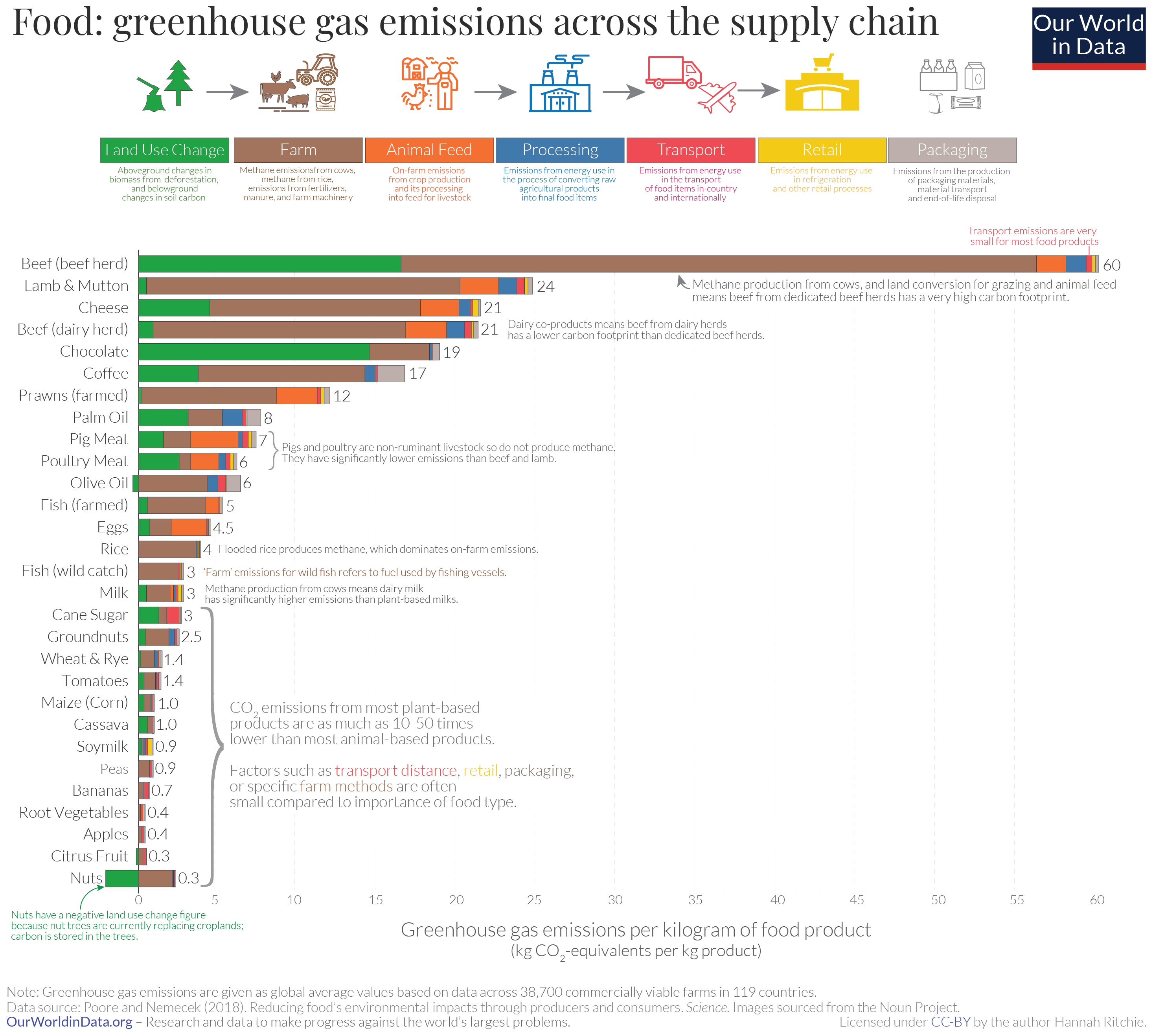In the last decade, “going green” was one of the biggest trends. We saw everything from the rise of home solar and electric cars to the renaissance of compostable straws and reusable lunchboxes. People questioned fast fashion, reduced omissions through public transport and ridesharing, and looked for earth-friendly packaging.
Today, the conversation around “going green” is shifting to focus on how the food and beverages we consume impact the planet. Did you know eight in 10 people worldwide see climate change as a threat to their country? Emissions from animal-based foods along with land use, farming and animal feed are amongst food production methods most detrimental to our environment, making our food sources a significant part of the problem (Our World in Data).

Due to technological innovation and increased awareness of sustainable living, particularly amongst millennials, plant-based proteins and animal product alternatives are becoming mainstream. Food and beverage options are emerging given the demand, the more realistic taste and presentation, and the lowered impact on Mother Earth given the sustainable practices used to create, ship and promote them. The alternative protein market is growing annually and expected to reach $17.9B by 2025. Forbes even lists plant-based foods as one of the biggest trends to look out for in 2021 citing the sector received $1.3B in investments during Q1 of 2020. This is all proof consumers are seeking new products to incorporate into their diets.
Scientists agree shifting towards a more sustainable diet is “inevitable,” and changes to how our society consumes food are crucial to keep up with demand. Emerging trends in the plant-based food sector include fake fish, vegan cheese and new frozen selections.
To give a glimpse into the sustainable food and beverage category, we put together a list of brands to keep an eye on as they are revolutionizing the industry.
Food
One of the first mainstream, vegan-friendly options to gain attention was Beyond Meat, famous for resembling and tasting like a juicy hamburger, and expanding to recreate the taste of breakfast sausages, meatballs, and tacos. The brand saw enormous success, raising its visibility with a memorable ad campaign with Burger King, and being listed on the stock market where it’s expected to be the next $40B food company. Grocery stores are stocking more of these options and shoppers walking down the aisles can spot the Impossible Burger, Morning Star and Quorn meat alternatives, among many others. These proteins aren’t just for at-home use either – major chains from IKEA to KFCare exploring ways to introduce the products to their menus to not only normalize plant-based alternatives, but to meet consumer demand.
While plant-based burgers got all the glory in the beginning, newer brands are getting creative, releasing even more products replicating meat and poultry to stay competitive. Yves Veggie Cuisine’s Good Dog is a plant-friendly alternative to everyone’s favorite ballpark fare. Made with a base of soy, tofu and wheat, the hot dog spinoff tastes like the real thing. Tofurkey creates plant-based deli slices for a kinder sandwich, also using soy and wheat, to recreate the taste of turkey, ham and oven-roasted chicken. Meati Foods refers to itself as “meat, if animals invented it.” The brand creates fungi-based chicken, packed with 16 grams of proteins, vitamins, minerals, high in fiber, and uses 99 percent less water and 99 percent less carbon dioxide than meat. Air Protein launched as the world’s first air-based meat creating nutritious and sustainable chicken, beef, seafood and more. Inspired by NASA’s closed-loop carbon cycle concepts for a long-journey space mission, the brand set out to solve the growing problem of global food demands, combining air, water and mineral nutrients to mimic the taste of animal proteins.
While there is an emphasis on eating “cruelty-free,” proteins don’t have to be vegan to be sustainable. In fact, it’s proven that if the average household substituted red meat and dairy with chicken, fish and eggs, the family’s consumption would be equal to zero food miles*, significantly reducing emissions. BlueNalu is a leader in cellular aquaculture, with a mission to provide healthy seafood and support the sustainability of our oceans. The global demand for seafood is at an all-time high, which the industry cannot keep up with as the population of marine species is half of what it was in 1970. Average consumers aren’t aware of how companies source seafood, including overfishing and illegal fishing, which contributes to the rising ocean temperatures and environmental changes. BlueNalu works to source fish locally, collaborating with a mix of industry experts including non-profits, universities and restaurants. The brand doesn’t use genetic modifications or antibiotics to produce seafood, common practices with farmed fish.
Beverage
Outside of food, beverage companies are also making the switch for a more sustainable future. During a grocery trip, shoppers might see white cartons with “Boxed Water Is Better” in bold, black typeface. Not only is the boxed water stylish, but it’s also eco-friendly, eliminating plastic and using 100 percent recyclable containers. Boxed Water also worked to plant more than one million trees in National Forests. While most people agree the sustainable choice is to refill a reusable water bottle, there are other alternatives to single-use plastics when in a pinch: Open Water uses aluminum to create plastic-free bottles, and its water is also certified Climate Neutral. The company also donates a portion of proceeds from each aluminum water bottle sold to ocean conservation projects.
Coffee lovers can also start off their morning sustainably, with a responsibly sourced cup of coffee. Atomo! Molecular Coffee doesn’t use beans and instead replicates the taste with a unique blend of seeds, kernels, pits, stems and leaves. Scientists researched plants that produced seeds with similar qualities to coffee beans and that naturally produced caffeine to create this new “coffee.” Even major brands and retailers such as Starbucks and Keurig are working on ways to make their coffee more sustainable.
Alcohol brands are getting involved in becoming kinder to the planet too. This summer, SCS Global Services announced it certified New Belgium Brewing’s Fat Tire Amber Ale as America’s first nationally-distributed carbon neutral beer, in celebration of International Beer Day. New Belgium is making responsible choices and commitments to renewable energy, using wind power and solar panels to produce beers. The brand’s goal is to become fully carbon neutral by 2030 and is donating millions of dollars to climate change and environmental causes. In addition, spirit brand Diageo, known for producing Guinness and Smirnoff, is launching a plastic-free, paper-based bottle of Johnnie Walker whiskey in 2021.
Winemakers focus on a variety of certifications to confirm their reds, whites, and rosés are good for the planet, including if the wine is organic, salmon safe, or certified green, depending on the country. Many wines are not deemed sustainable due to the anti-pest and fungal processes that are not natural or healthy for the soil, and some places, such as Washington state, don’t require these chemicals thanks to the natural habitat. Keep an eye out for sustainable wines, like the LEED-certified wines from Hedges Family Estate.
Instead of only focusing on the inside product, Cantina Goccia also looked at its packaging by creating the “Frugal Bottle.” made from 94 percent recycled paperboard to hold wine. The bottle is not only better for the environment with a carbon footprint up to six times less than a glass bottle, but also easier to recycle, five-times lighter than a normal bottle, and simple to transport. In the beer industry, sustainable technology firm Footprint introduced a compostable six-pack beer ring for Colorado Native to keep cans together. The rings are made from post-industrial recycled fibers that avoid plastic pollution and ensures the product can breakdown even when incorrectly disposed of.
Are you a sustainable food or beverage company with new ideas to bring to the table? We are always looking to help those making a difference. Email us at rebecca@kiterocket.com or contact us here.
*Food miles are measured in ton-kilometers which represents the transport of one ton of goods by a given transport mode (road, rail, air, sea, inland waterways, pipeline etc.) over a distance of one kilometer


